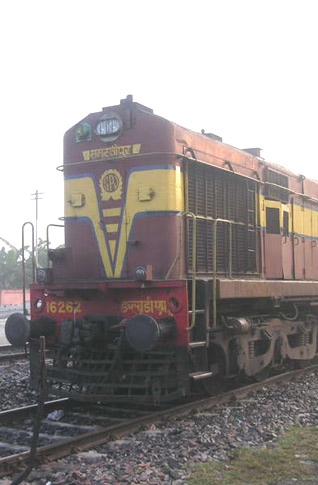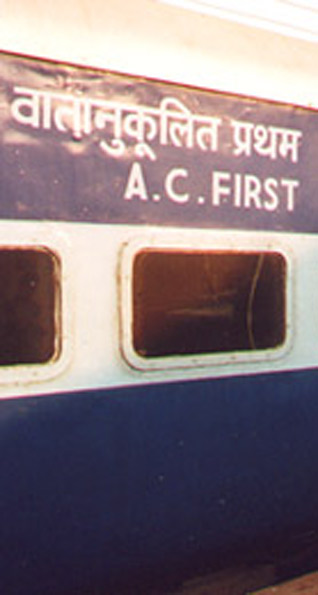Travel
The Train From New Delhi
T. SHER SINGH
DAILY FIX
Thursday, July 26, 2012
It was going to be an 18-hour journey, starting from New Delhi, India’s capital, heading south-east for Patna, in the general direction of Calcutta.
I had opted for the Rajdhani Express, a fancy new train service between two of India’s major cities, with far fewer stops than usual. More precious than anything else, it was completely air-conditioned - a fact which justified the fare at several times higher than the normal rate, in view of the 50 C temperatures under the June sun.
The train left the New Delhi railway station late in the afternoon. On time, exactly on schedule. Punctuality was one of the pride and joys of this new, much-advertised service.
About three hours into the trip, the train slowed down, and gradually came to a stop. I looked out of the sealed, tinted windows. It was still light outside. I could see we were in open country, with nothing but fields in sight. I turned away and went back to playing cards with my neighbours; there was nothing unusual about an unscheduled stop in the middle of nowhere.
I had lived in India long enough -- before immigrating to Canada -- to have done a life-time of train journeys and knew the behaviour patterns of the country’s trains. They needed to stop from time to time.
So, neither I nor anyone else, paid any heed to the delay. True, we’d been promised punctuality. But, no matter what, to expect trains to be strictly on time in India was nothing short of being unreasonable.
The minutes grew longer. An hour went by. Then another. Now, that was unusual! I began to get fidgety, but said nothing.
Then, suddenly, it grew warm. Somebody noted that the air-conditioning had been turned off. Within minutes, we began to feel uncomfortable: the windows were sealed, so there were no cross-currents.
We opened the doors. The fresh evening breeze wafted in and brought welcome relief. We crowded around the doorways, admiring the twilight. Another hour went by.
It was dark now.
I saw that a few passengers had stepped out and were strolling on the gravel. I too clambered down the vertical steps. I asked a passer-by what was going on. “Who knows?” He shrugged. I was from Canada. I knew my rights. The non-answer did not sit well with me.
I walked over to the engine a few cars away. The driver (engineer?) was sitting on the ground, surrounded by his helpers. I interrupted the chatter as politely as I could and asked when we would be on our way.
“Who knows?” he shrugged. They all shrugged, in sympathetic resonance. I could see they were waiting for my next question.
I can see now, with the benefit of hindsight, where I learnt one of the skills that came mighty handy years later when, as a trial lawyer, I had to prepare my clients and their witnesses for cross-examination. “Answer precisely what you’re asked. Never say more, or less. Tell the truth, but don‘t volunteer more information than you absolutely need to …!”
I became a bit pushy. And daring. “What do you mean, ‘Who knows?‘ “
“Exactly that. Who knows? I don’t know, he doesn’t know, nobody knows.”
I reminded myself I was on a different planet and needed to realign my approach.
I sat down with them, shed my mantle of North American impatience, and jumped headlong into their small-talk. It took me a while, but finally, half-an-hour later, here’s what I gathered:
As of 6:00 pm that day, the All India Railway Workers’ Union had gone on strike. Therefore, at 6:00 pm sharp, the train had been brought to a standstill, even though the moment found us in the middle of nowhere. My new-found friends were members of the Workers’ Union. They were waiting further instructions from strike headquarters.
It was 1973. The gods had not given us cells phones yet. How would further instructions arrive, I asked cautiously. Easy, they said. Ramu here climbs up on that telegraph pole … there, the one out there in the fields; yes t-h-a-a-t one! Clips on a few wires, plugs in his mobile phone, and he talks to the Comrades for updates.
In the meantime, they told me, the air-conditioning would remain shut-off in order to conserve power. The lights too would be turned off shortly.
“But why did you leave New Delhi station if you knew that there was going to be a strike at 6:00 pm?” I asked timidly, not wanting to offend any sensibilities.
“Simple. Because we weren’t on strike then, that’s why!” their fearless leader replied. All of them rolled their eyes in unison. That should be obvious, they seemed to say.
It sounded like common sense, it did … so perfectly logical and rational.
“How long will it take?” I asked, as I stood up. I knew I had lost all credibility with them, what with my inane, infantile questions and all.
“Who knows?” Each of them shrugged his shoulders and solemnly shook his head. “Maybe tonight. Maybe tomorrow. Maybe later this week. Who knows?”
I took the news back to my fellow passengers. They shrugged their shoulders and went back to whatever they were doing: playing cards, reading, chatting, snoozing …
I retreated to my corner to assess the situation.
I moped for a while, losing track of time. I hadn’t even got to the havoc all of this was going to cause to my itinerary, when I heard a growing din outside. We looked out of the doorway: a crowd had gathered beneath our windows.
Apparently, word had got around in the neighbouring villages that a train was stranded in the vicinity. I could see that the numbers were swelling quickly; more shadows were emerging from the dark beyond.
This finally got the attention of my fellow passengers. They hastily shut and locked all the doors. We had a quick conference in the dark. We concluded within minutes that we had a problem on our hands.
Fact no. 1: Most Indians then did not carry credit cards, even the affluent ones. They carried cash with them whenever they travelled on business … or even vacation. Wads of it in their suitcases. The people inside the train were affluent Indians. Which meant the train was a mini, Indian version of Fort Knox on wheels.
Fact no. 2: The area surrounding us was extremely impoverished. We were in Uttar Pradesh by now, the core of the Hindi belt; one of the poorest regions of the country, and not an area overly given to concern for the welfare of others. They had other preoccupations. The faces glued to the windows by now, staring in, obviously belonged to the very poor.
Our conclusion: we were sitting on a tinder box. All we needed was a spark and things could explode. We had no defence. The only thing that separated us from a potential mob was a few dozen glass windows.
The din grew outside. We could see that the numbers had grown. We were the biggest show in town. Possibly, in living memory.
Inside, we huddled. Somebody had a brainwave. We discussed it. We endorsed it. All within minutes.
We opened the doors. Announced to the crowd that this was a special train, a “thunda gaarrhi” with “thunda dibbaa-s” - a ’cold train’ with ’cold compartments’. We described to them its air-conditioning system and facilities. They were curious. We announced that if they formed a queue, we would let them walk through the train and see for themselves its luxury and advanced technology.
They crowded around the doors. We insisted they line up. They did. We worked out a system. They’d enter from one end of the train and exit at the other.
And so the grand tour began. It took several hours, though. It wasn’t until dawn that the last villager straggled home.
We were exhausted, physically and emotionally. We slept until mid-day, oblivious that we had left the doors open through the night. The return of the heat, followed by flies, had woken us up.
We were resigned this time around. We just sat in a stupor, doing little. It was too hot to go out until the evening came around once again. We went for long walks. Neighbouring villagers brought us food and water. We sheepishly accepted their hospitality. We offered money. They turned it down.
We waited. And waited. For a total of 22 hours. Then, without any warning, the whistle blew long and shrill.
Somebody, somewhere, had decided, mercifully that the strike was over.
Once all had boarded, the wheels began to move. The lights came on. A gentle breeze began. We cheered.
I thought about the experience a lot during the rest of the journey.
Could I have done something at any stage to save myself this harrowing experience? I couldn’t think of any.
Had I done anything wrong, a misstep at any juncture, anything, which put me in this predicament? I couldn’t think of any.
All I could come up with was: This is India … a land of perfect logic.
TOMORROW: More ‘perfect logic’ ...
Conversation about this article
1: Sucha Singh (Pittsburgh, PA, USA), July 26, 2012, 10:08 AM.
All I can say is: It's your fault that your trusted Indian Railways. Once, a person decided to commit suicide on an Indian railway track. Someone asked why he had a food-pack by his side. The answer was, "What if the train is late, or never comes. I don't want to die hungry."
2: Baldev Singh (Bradford, United Kingdom), July 26, 2012, 6:35 PM.
Yes, been there! Delhi to Burdwan, the locomotive broke down! On another occasion, got a derailment too! It's Indian Railways!
3: Sangat Singh (Kuala Lumpur, Malaysia), July 26, 2012, 8:29 PM.
This is a far cry from the olden days when the train would start from Bombay and God knows when it would reach "Guru ki Negri'. This couple was getting fidgety and kept asking the TT (conductor), "Bhai Sahib, when will we reach Amritsar?" "It will reach malom naheen (don't know) when." "My wife is pregnant and might deliver any time." "Well, you should not have traveled in this condition." "No," said Sardar ji, "She wasn't in that condition when we started."
4: Dya Singh (Melbourne, Australia), August 06, 2012, 2:43 AM.
I just had to read this! Reminds me of a joke ... A Sardar purchased tickets to Ludhiana from Delhi. Lo and behold - the train rolled in right on time. He complimented the station-master, who replied - 'Sardar ji, yai to kal ki ghaarri hai, jo kal itne bajay aani thhi!'




